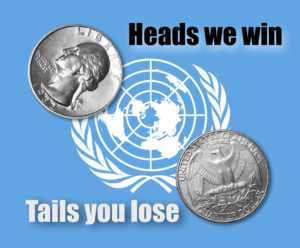Why does it matter?
Let me address that question the long way round. 
Understand how I got to the position I found myself in.
In the beginning, all I was interested in doing was preserving my professional reputation. It was as simple as that.
I had spent over 25 years without ever once having my abilities or my professionalism – or heaven forbid my integrity – ever challenged once; now OIOS was insisting that I was so incompetent that I should be in the remedial class – while insisting that they did not need to tell me what I was alleged to have done wrong.
This was more than just a question of supervisory style; it was a deliberate attempt to ensure I had no future as an investigator in the UN. Worse yet, it was a deliberate attempt to destroy the one thing that was central and indispensible in my career. Everyone has something they will fight for; mine was my professional reputation. That was not only the most important asset I had, it was the only thing I had that was irreplaceable – and OIOS was using it as a public urinal. Simply walking away was not an option, because I could never get another job as an investigator anywhere in the world with that PIP on my record.
In the real world, investigators are employed to find out information that people do not want to divulge, so to expect any investigation company to simply employ me without digging into my backgrounds was unlikely in the extreme. I had survived in Asia on my own for 20 years, with no major organisation to wipe my nose, provide anything for me or protect me if I got into a mess. I had never been the subject of a single professional complaint, I had never even been threatened with a lawsuit and nobody ever had cause to criticise me professionally. Now the UN wanted to insist I was a semi-literate moron with poor judgement…..
As a secondary concern, the PIP was bullshit anyway. It proved to me that OIOS had a perverse concept of what an investigation was, and what an investigation was even supposed to achieve…..
What happened over time, however, was that I morphed through the frustration and the stress. Spurred on with every stupid decision and every illogical argument the UN threw at me and as the retaliation from OIOS got increasingly desperate, I came to a point when there was no doubt left in my mind at all; the PIP, the management of OIOS and the entire UN management infrastructure was nothing more than a joke.
All that anyone ever had to do was answer my questions and tell me what I had done that was so wrong. They couldn’t, and there is only one plausible explanation as to why they couldn’t.
That still left the fact the PIP was bullshit, and by the time I got to the point of seeing the UN in terms of being a joke, that became to be very significant. In fact it was more than just significant; it was sinister.
Why?
Start by watching the Vice Media documentary.
Now consider what happens when a UN staff member commits a crime.
Anything the UN says publicly about ‘accountability’ has to be contrasted with what they do in reality.
The UN hides behind the shield of the Convention on Privileges and Immunities, and uses that immunity, not only to protect UN staff members accused of any criminal offence, but to prevent UN staff members from co-operating with criminal investigations even where the suspect is not a UN staff member! That’s what they did in the C.A.R.
When a UN is reported for a criminal offence – be it corruption, embezzlement or rape, the UN does not investigate that criminal offence, instead they only investigate them to establish whether or not they may have broken the UN Staff Regulations & Rules.
Granted, if the OIOS investigation established that they have committed a crime, once the UN has finally reached a decision on whether they should be disciplined under the staff rules, they can then refer the case to the national authorities of the country concerned for criminal investigation – but by the time that happens, several years may have passed, and if the subject of the investigation had the brains he was born with, he will have resigned anyway.
So imagine the UN does actually report a sexual assault to the authorities in Haiti; advising them that a criminal offence appears to have taken place three or four years earlier, and naming a (former) UN staff member as the perpetrator.
The first thing for the Haitian National Police to do is find the victim. The UN does not know where she can now be found, nor can they assist locate any of the witnesses, but there has also been plenty of time for interested parties to bribe them to recant any information they gave to the UN investigators. The UN cannot even locate the subject of their investigation; if he has left the UN, he could be anywhere in the world. He may have returned to his home country, he may have settled somewhere else.
Even trying to interview the accused will require the involvement of the Haitian Foreign Ministry and more diplomatic bureaucracy that you can shake a stick at. The Haitian National Police cannot be blamed for taking one look at it and filing the UN report in the ‘Too Hard’ basket.
That, of course, is what happens when OIOS does establish that a criminal offence appears to have taken place.
If they do not, and if the OIOS investigation results in a Closure Report, the staff member will never even be interviewed by the local police because the UN will not waive the immunity.
So now look at the PIP, because what OIOS clearly wants to do is slant the odds in favour of clearing the staff member.
OIOS put in writing that an investigation should only be conducted by means of asking pre-approved questions. An investigator should only ask questions to establish whether or not the staff member is liable for the misconduct for which he is being investigated – and nothing else. An investigator should approach that “investigaton” with a closed mind and never ask questions “just to satisfy his curoiusity.”
Under those conditions, the chances of establishing misconduct are reduced enormously. When interviewed, the staff member can even explain that he did not commit the sexual assault he is accused of because he was off committing another criminal offence at the time….. and OIOS will be content to accept that?! When I asked about this, is it any wonder OIOS would not/could not respond?
If OIOS does not carry out a comprehensive investigation, designed to actually find out what happened, the net result is that wrongdoing is protected.
What happens if the report that is made is not an allegation of sexual assault, what if it is a report that a certain UN Staff Member might have accepted a bribe?
Ah, well that opens up a whole new drain down which allegations of corruption have been flushed for many years.
That, OIOS has insisted for many years, is not “misconduct” it is instead a “contracts issue” …so it is not investigated. OIOS was able to do that because Deputy Director Michaled Dudley had control of the Investigations Intake Committee, and was therefore able to decide that any complaints that were potentially embarassing to senior managament were never investigated. Oddly enough, Michael Dudley has an impressibe record ofnever being held accountable for any of the myriad of complaints against him.
That, of course, should not be considered suspicious because the “proper procedure” was always followed. If the “propor procedure” is followed, the UN could feasibly decise that a cat was in fact a dog. The legal system bends over backwards to hold that the result of any investigation cannot be challenged.
 What happens if the report of misconduct never even gets as far as OIOS? In those case, the fact OIOS is supposed to be “independent” goes out of the window, because the UN gets to filter the reports that are investigated.
What happens if the report of misconduct never even gets as far as OIOS? In those case, the fact OIOS is supposed to be “independent” goes out of the window, because the UN gets to filter the reports that are investigated.
This is done by the Conduct and Discipline Unit. Where else in the world is there an independent organistion to investigate crime and misconduct, but where the those investigations are filtered through another department that protects the most senior officials from ever being investigated for anything?How is OIOS supposed to be “independent” when the Organization has an influence over what is or is not investigated?
Moreover, is anyone expected to believe that the Head of Conduct & Discipline (who was magically appointed without the inconvenience of actually having to compete for the job) just happened to be the wife of the OIOS Deputy Director Michaled Dudley who controlled the Investigations Intake Committee.
But don’t worry about that; the UN does not see anything wrong with that arrangement…..
So, now you ask “How does the UN deny they have a problem with fraud, corruption or sexual exploitation and abuse?”
That’s quite simple – especially if you are unwilling to question anything. The UN’s strategy is to respond to any such allegations with the following agrument:
- there cannot be a problem with any of these things because hardly anything like that is ever reported. And if it is reported, don’t worry because:
- the fool who reported it will soon learn that by doing so, he has shot his own career in the head, because the Organization will then make his life miserable.
And if that staff member complains that they are being retaliated against? Don’t worry, because
- the Ethics Office will dismiss their Application for Protection against Retaliation;
And if the Ethics Office actually does actually recognise that it is retaliation? Don’t worry, because
- the retaliation will be investigated by OIOS, who will usually close the case.
And in the final analysis, even if the OIOS investigation identifies retaliation and the Ethics Office is forced to do something; the Secretary-General can still take no action and it is established law in the UN that the staff member cannot challenge that because they have no right to “whistleblower protection”.
So that deals with the complainant, what about the complaint itself? What happens to the  report of the fraud, the corruption or the sexual exploitation and abuse?
report of the fraud, the corruption or the sexual exploitation and abuse?
Don’t worry, because
- Conduct & Discipline usually dismiss the complaint as “not credible”, and if Conduct & Discipline cannot do that? Don’t worry, because:
- OIOS usually go along with a check-list of pre-approved questions to ask (making sure they never ask questions just to satisfy their curiosity) and that usually allows them to close the investigation.
And that is before we start worrying about the UN “justice system”……
OK, so what would happen if an OIOS investigator actually thought that fraud, corruption, or sexual exploitation and abuse cases in the organization should be investigated professionally and diligently?
Ah well, in that case, he would obviously be just WRONG and we know that he would be wrong because the entire UN system would agree….
 …because the people who have most to lose if OIOS actually did any real investigations have a vested interest in making sure he was wrong.
…because the people who have most to lose if OIOS actually did any real investigations have a vested interest in making sure he was wrong.
This is not about me.
It was in the beginning but it stopped being about me a long time ago.
This is about the girls in the IDP camps in Haiti and the Sudan, who are sexually exploited by UN personnel. It is about the UN officials who misrepresent the problem of the rape and murder of civilians who look to the UN for protection.
This is about the children in the Central African Republic who the UN knew were being raped and who the UN chose to ignore.
This is about the UN budget, and why nobody is interested in making sure it is not spent on those people. This is about why nobody is interested in making sure it is not embezzled by UN officials or diverted into the coffers of corrupt politicians, local militia groups and terrorist organisations.
This is about how the UN protects its own staff who are responsible for all of this corruption, and why the UN’s negligence can leave nine year old boys to be repeatedly raped, and the UN staff who allowed it to continue carry on with their careers as if nothing happened.
Accountability? Don’t make me laugh.